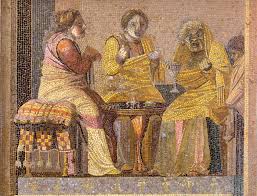Roman Womens Rights: Women were not citizens of Rome. Only adult free men were citizens. The ancient Roman men believed that a woman had to be under a guardianship. That guardianship could be a father or a husband. But they believed a woman was unable to direct her own activities.
How did class affect roman women’s rights
During the 200 years when Rome was a kingdom, a wife was the center of the household. It was her job to take care of her home and family. She taught her daughters how to cook and sew. But women had no rights.

A woman could not even make a suggestion to her husband. Her guardian, her husband or father, had complete control over her activities. In most families, women could shop, visit a temple, or chat in public. But she could not participate in government. Few women wanted additional rights.
Woman Rights in civil and public functions
Moreover, the woman was excluded from all public functions and rights: “Women are excluded from all civil and public functions and therefore can neither be judges nor carry any civil authority; they cannot bring a court case, nor intercede for someone else nor act as mediators”.
Any historical investigation into the lives of ancient women involves individual interpretation and much speculation. One can read the ancient sources concerned with women and their place in society, but to a large degree, they are all secondary sources that were written by men about women.
No ancient journals or personal diaries were written by Roman women were uncovered, so it is not known what their hopes and dreams were, or if they had any.
Roman Womens Rights Facts
What Roman women felt about most political issues and the numerous wars and upheavals is also a mystery. Nor can we read about what women thought of slavery, marriage, or the fact that they had no legal Roman Womens Rights over their children or even themselves.

Although the woman was considered a Roman citizen, she obtained her position only through her husband. Neither slaves nor women could carry their own name. Only men carried this distinct sign of their being a Roman citizen.
- The woman could not have charge of another person. “Tutela virile Officium est”. She could not have the patronage of her children and cousins (except in later Roman law).
- Women could not function as witnesses, whether at the drawing up of the last will or in any other form of law. “The woman is incapable of being a witness in any form of jurisprudence where witnesses are required”. Women were reckoned with minors, slaves, the dumb and criminals to be incapable of being witnesses.
- Women could not start a court case without being represented by a man. Women cannot represent themselves in law “because of the infirmity of their sex and because of their ignorance about matters pertaining to public life”.
- A woman did not count as someone in politics. She could not vote or be a witness in court – unless she was a vestal. A woman was also unable to possess her own things. As a girl, she was dependent on her father, as a married woman, to her husband, and as a widow, to a tutor.
The general law was: “In many sections of our law the condition of women is weaker than that of men”.

Divorce for the woman was in the early part of the Empire impossible, even if her husband dated another woman. Husbands in Rome reserved the right to murder both adulterating wives and their lovers if they discovered the infidelity under the law itself. Later, however, women were allowed to divorce – without even having to give a reason.
More info on- Rome women’s clothing, Men’s clothing



